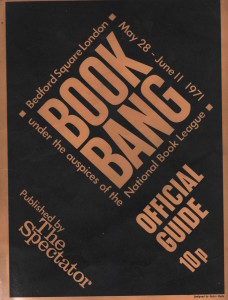 Rescued from a pile of magazines is this programme of events for The Book Bang, which has been called ‘the first literary festival ‘. I doubt whether it was, but it was certainly a memorable event in 1971, and I seem to recall it being advertised widely in London. Held in, appropriately, the middle of Bedford Square, in the heart of Bloomsbury, between May 28 and June 11, it was organised by the National Book League under the direction of its Chairman, the former bookshop owner Martyn Goff.
Rescued from a pile of magazines is this programme of events for The Book Bang, which has been called ‘the first literary festival ‘. I doubt whether it was, but it was certainly a memorable event in 1971, and I seem to recall it being advertised widely in London. Held in, appropriately, the middle of Bedford Square, in the heart of Bloomsbury, between May 28 and June 11, it was organised by the National Book League under the direction of its Chairman, the former bookshop owner Martyn Goff.
The seed for this event had been planted in the mind of Goff in 1965, when he read a letter in an issue of The Bookseller from Desmond Briggs, of the publishers Anthony Blond, hoping that in the future a book fair might become a sort of circus and be held in candy-striped tents. When he was appointed Chairman of the NBL Goff knew that such an idea was feasible and he promptly went about preparing the ground by consulting experts and sponsors.
In his introduction Goff shows prescience in warning about the threat that ‘new media ‘posed to books:
‘Expansion of the number of hours and channels of television broadcasting: the arrival of video cassettes: microfilms and microfiches, to name but some of the competitors, will blot up hours and money that might otherwise have gone to books…’He also blamed the expansion of higher education, where in the eyes of many students, books were seen solely as a means to attaining a particular qualification. ‘ ‘Books must be shown to be fun ‘, Goff urged . Booksellers must also appeal to someone who would not normally enter a bookshop, but who might buy a book on a subject that interested them. They must be made aware of’ just how many books on his own subject are available’.
To this end the Bookbang was innovatory in arranging the 10,000 titles on display by subject. This meant, of course, that the task of displaying the books was taken out of the hands of the publishers and put into those of the National Book League, which charged the publishers for this service. The 50p entrance fee would provide the rest of the funding necessary.
The fiction ‘ construction’ will not be a tent, Goff declared, and the books within it would be classified into ‘ general, romantic, crime and horror ‘.A twin structure would house the poetry and ‘ hour after hour of poets ‘ reciting their work would be the main attraction here. A glance at the Bookbang programme gives us some idea of the writers and performers who took part. The more prominent poets included Stephen Spender, John Fuller, Ian Hamilton, Vernon Scannell, Jon Silkin, Seamus Heaney, Dannie Abse, George Barker, John Heath-Stubbs, William Plomer, Ted Walker, Adrian Mitchell, Alan Brownjohn, and Tony Harrison. Dramatists included Henry Livings, Alan Sillitoe, Simon Gray and Christopher Hampton ; among the novelists were Kingsley Amis, B.S.Johnson, Jilly Cooper, Dick Francis, Michael Moorcock, and Margaret Drabble. Non-fiction was not particularly well represented, but Nikolaus Pevsner, Patrick Moore, and Antonia Fraser did their best.
There were to be a number of non-literary events too. Someone from The Milk Marketing Board gave a demonstration and a young lady called Mary Berry did some cooking. I wonder what happened to her. Sooty and Sweep performed something or other with Harry Corbett and two laughter-makers from different generations—Tommy Trinder and Johnny Speight—got together for some kind of performance. Cliff Richard was there to talk about Christianity and Spike Milligan promoted his second world war memoirs. Even Catweazle (in the shape of Geoffrey Bayldon) presented some prizes for children. And just to show how right-on the Bookbang was, Friends of the Earth organised a feature on ‘ Our Environment ‘. {RR]

I spent probably the happiest six weeks of my working life when employed by Annabel Pink at Book Bang in 1971. We had a stock room in the basement of one of the major publishers, Cape or Chatto I can’t remember which. However I do remember the shelving collapsing with me underneath it – shaken but unharmed! Ms Pink tore into the publishers who instantly sent a couple of ‘handymen’ down to secure the offending racking. During the two weeks of the event I was left to man the information desk within the bookshop area and met a great number of interesting people, received two or three job offers and a couple of decidedly ‘dodgy’ propositions which I quickly and emphatically declined.
I still have the Stock Room Sign which hung on the railings outside the basement.
Happy days……………..
Pingback: Rylands BlogThe National Book League and the house that became “the centre of the world of books”.